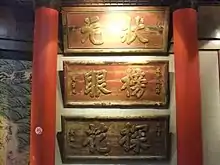Qing literati
Qing literati (wenren Chinese:文人) were officially designated as literate or cultivated persons. Parallel to wenren are two terms, "shi"(Chinese:士), scholar, and "shen"(Chinese:绅), often defined as gentry or official. [1] Candidates who achieved the lower degree were called shengyuan (Chinese:生员). Those who pass the second test could take the third test - known as the highest test, held in Beijing every three years. The people who pass this final test were jinshi (simplified Chinese: 进士; traditional Chinese: 進士) which is the highest level a literati may reach.[2]
Qing educational system
The Qing education system is mostly derived from Confucianist. It includes "Four Books and Five Classics"(Chinese: 四書五經; pinyin: Sìshū wǔjīng). Generally, people begin their studies when they are very young and attempt[3](p145) to pass three tests throughout their lives. Scholars who pass the Imperial examination obtain the "Jinshi" degree and have a chance to make it into the central Government.
Literati life

Civil examinations mediated the classical discourse of "way learning" and literati into everyday lives. Tensions, which brought a few fame and fortune, left most dealing with disappointment.[4] Literati often turned to religion and the manic arts to channel their responses to the competitive examination. Those who failed the civil examinations often mocked the selection process in popular novels, such as Wu Jingzi's (1701-1754) The Scholars, and vernacular stories by Pu Songling (1640-1715). Such narratives framed the examination process from the angle of the failures. Such works appealed to both elites and non-elites. Recorded dreams and auspicious events were manifested in nonofficial accounts of the examination candidates, which the public used for explaining their individual success or failure.[2]:
Examination success usually meant career success, but what success meant in terms of careers changed dramatically from Ming to Qing. All but palace degree-holders were down-classed by the late Ming, while in the Qing even palace degree-holders frequently had to wait years to gain an appointment as a magistrate or prefect once they passed in the bottom tier. Social prestige, legal privileges and corvée labor exemptions kept most commoner families from competing in the examination market. The diminishing opportunities for examination success by the nineteenth century exacerbated human frailties. No earlier dynasty ever faced a demographic expansion commensurate with the Qing, from 250 million in 1650 to 350 million by 1800.[2]:
See also
References
- Porter, Jonathan. Imperial China 1350-1900. Rowman & Littlefield. p. 213,214.
- Elman, Benjamin A. (2013). Civil Examinations and Meritocracy in Late Imperial China. p. 127. ISBN 978-0-674-72495-2.
- Elman, Benjamin A. (22 March 2000). A Cultural History of Civil Examinations in Late Imperial China. University of California Press. ISBN 978-0-520-21509-2.
- Nivison, David S. (1960). "Protest against Conventions and Conventions of Protest". In Wright, Arthur (ed.). The Confucian Persuasion. Stanford, California: Stanford University Press. pp. 177–201.